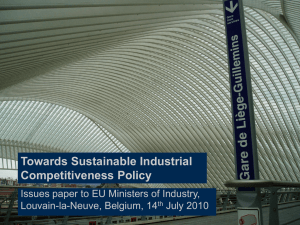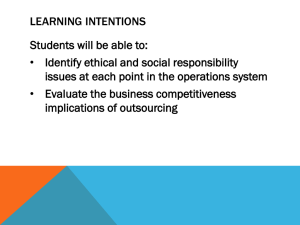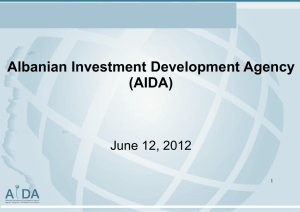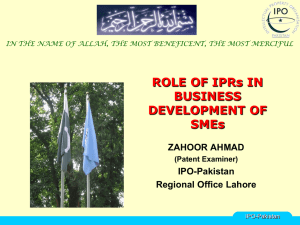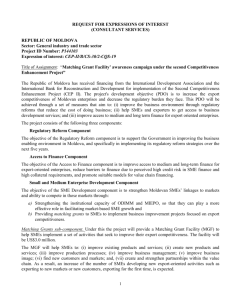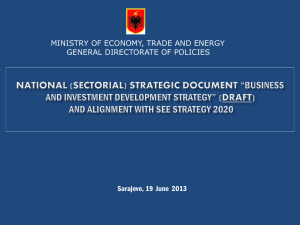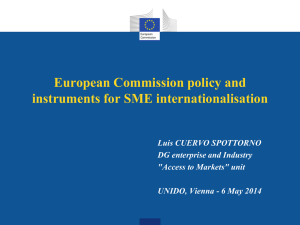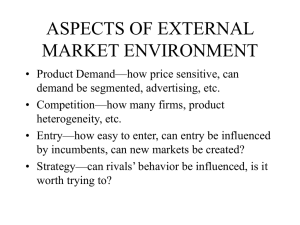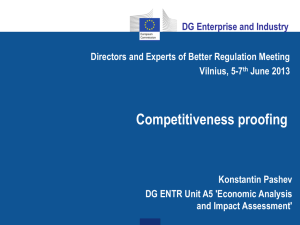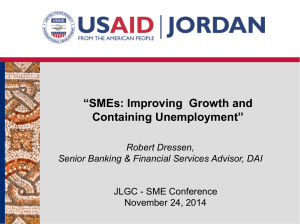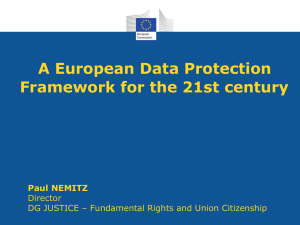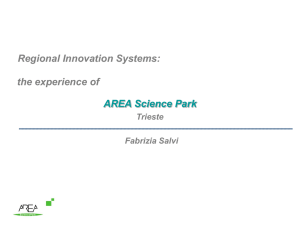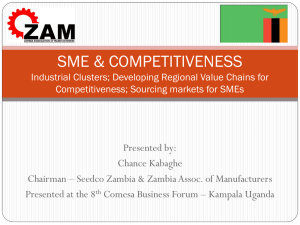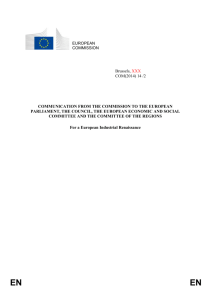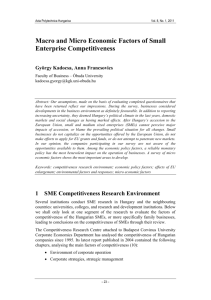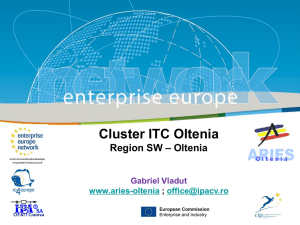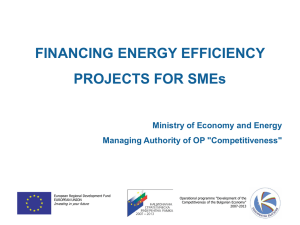(Industry) Session 2: The dimensional aspect of mainstreaming
advertisement
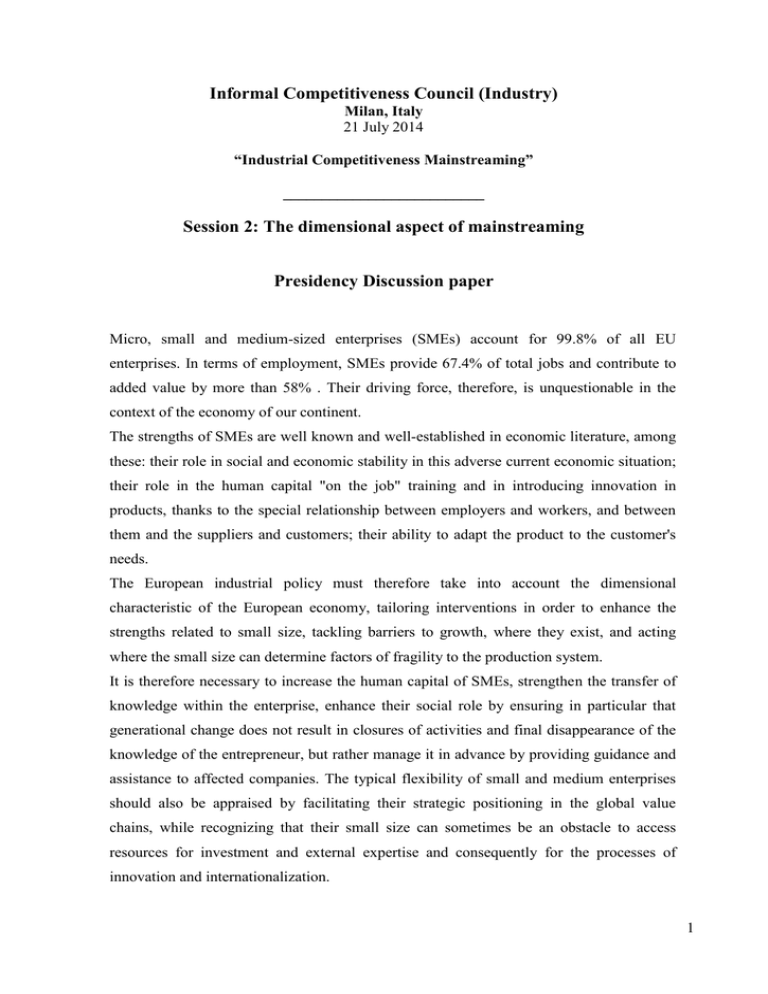
Informal Competitiveness Council (Industry) Milan, Italy 21 July 2014 “Industrial Competitiveness Mainstreaming” __________________________ Session 2: The dimensional aspect of mainstreaming Presidency Discussion paper Micro, small and medium-sized enterprises (SMEs) account for 99.8% of all EU enterprises. In terms of employment, SMEs provide 67.4% of total jobs and contribute to added value by more than 58% . Their driving force, therefore, is unquestionable in the context of the economy of our continent. The strengths of SMEs are well known and well-established in economic literature, among these: their role in social and economic stability in this adverse current economic situation; their role in the human capital "on the job" training and in introducing innovation in products, thanks to the special relationship between employers and workers, and between them and the suppliers and customers; their ability to adapt the product to the customer's needs. The European industrial policy must therefore take into account the dimensional characteristic of the European economy, tailoring interventions in order to enhance the strengths related to small size, tackling barriers to growth, where they exist, and acting where the small size can determine factors of fragility to the production system. It is therefore necessary to increase the human capital of SMEs, strengthen the transfer of knowledge within the enterprise, enhance their social role by ensuring in particular that generational change does not result in closures of activities and final disappearance of the knowledge of the entrepreneur, but rather manage it in advance by providing guidance and assistance to affected companies. The typical flexibility of small and medium enterprises should also be appraised by facilitating their strategic positioning in the global value chains, while recognizing that their small size can sometimes be an obstacle to access resources for investment and external expertise and consequently for the processes of innovation and internationalization. 1 A renewed attention to size in the broader context of strengthening of industrial policy was also reaffirmed by the European Council on March 20 and 21, which, recalling the Communication "Towards a European Industrial Renaissance", has set the goal of directing all European instruments to support industry and has recognized the need for interventions in favor of SMEs. In such context, the dimensional aspect can be addressed by three concomitant ways: 1) Taking into account the interests of SMEs in strengthening the process of governance for a systematic integration of aspects related to industrial competitiveness in the different European policies (mainstreaming): this is the dimensional aspect of mainstreaming. This approach should also focus on the analysis of impacts on competitiveness of new proposals from the Commission (competitiveness proofing) and the ability to assess the cumulative effects, direct and indirect, of different pieces of legislation (cumulative and indirect impact assessment) in order to identify undue charges, gaps and inconsistencies to be corrected. Because of its wide scope and potential impact expected on trade and investment, the transatlantic partnership on trade and investment (TTIP) can be inserted between the first areas of interest for the implementation of competitiveness proofing, as well as the climateenergy package, for the direct and indirect effects of its application on businesses, especially SMEs. 2) The second way to take into account the dimensional aspect regards the careful management of the agenda and the issues that will be brought to the attention of the Competitiveness Council. Consistent with the foregoing, food for thought may concern: "smart regulation" in order to improve the environment in which businesses operate and to reduce inflexibility; the need to ensure access to diversified sources of SMEs financing according to their life cycle stage; improve access to markets, technology and innovation. Reference is made in particular to key enabling technologies (KETs) and the objective of facilitating SMEs' access to technology platforms, public procurements in general and specifically the pre-commercials. Through a careful management of public demand, such as public administration discloses to the production system of the social challenges ahead, assuming an unprecedented role as a partner for business innovation. 2 3) Again on the subject of governance, the emerging opportunity of a fixed Presidency of the High Level Group, together with a work schedule of 18 months, will ensure work continuity and higher incidence of contributions to the Competitiveness Council. The Group may also stably avail itself of the significant contribution of the SME Envoy network, promoting a fruitful dialogue between the network itself and the Competitiveness Council, starting from the first joint report on the effectiveness of EU and national measures aimed at improving the SMEs competitiveness that the SME Envoy network will present to the Competitiveness Council on December 4-5, 2014. The above is to be considered only as a contribution to the debate, on the basis of which Ministers are invited to offer their contributions: On what packages is it considered appropriate to apply the dimensional aspect of competitiveness proofing? Could the climate and energy package and the TTIP be considered as pilot cases? How to strengthen the cooperation between the SME Envoy network and the High Level Group? Which of the topics mentioned , should be proposed as a priority to the Council? 3

